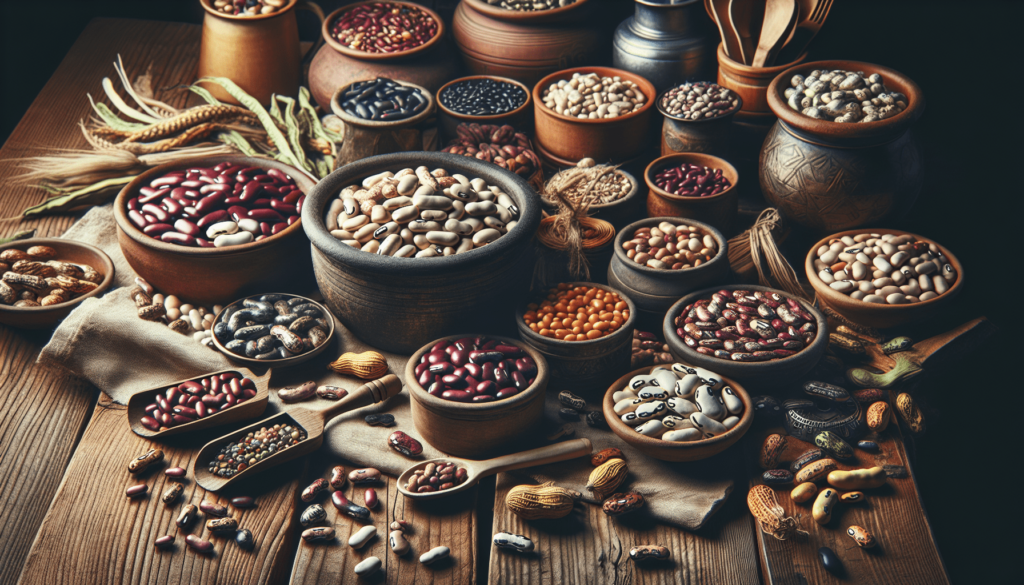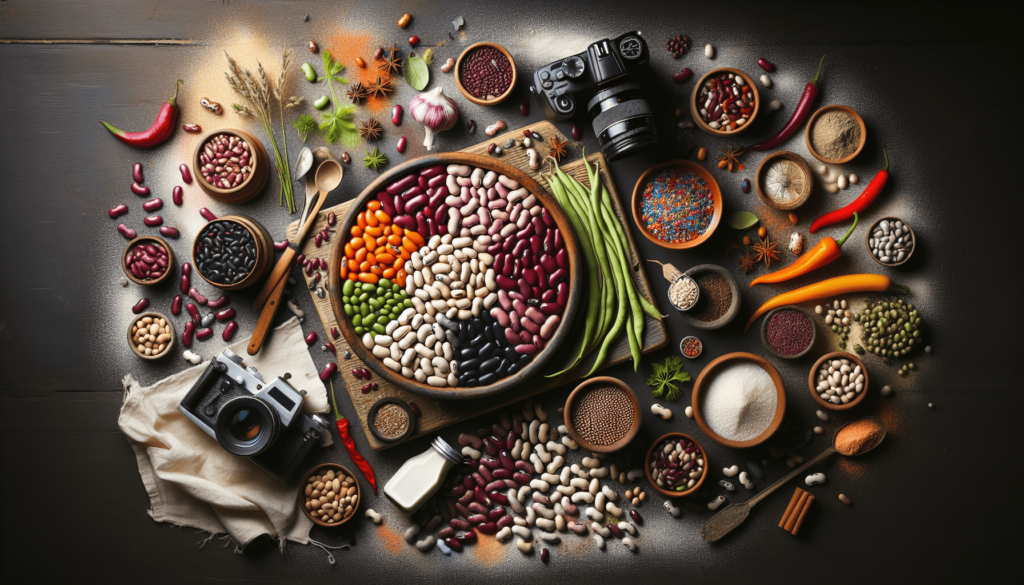Imagine a world where every meal was the same. A repetitive cycle of bland flavors and textures. Sounds pretty dull, doesn’t it? Thankfully, there is an unsung hero in the culinary world that adds a much-needed punch of diversity to our diets – beans. These tiny legumes, available in a plethora of varieties, play a vital role in enhancing the overall diversity of our meals. From creamy hummus to hearty chili, beans bring a range of flavors, textures, and nutrients to the table, making them an essential ingredient for a well-rounded diet. Let’s explore the incredible ways in which beans contribute to the overall diversity of our food.
Beans as a Nutritious Food Source
Beans are a highly nutritious food source that offers a plethora of health benefits. They are rich in protein, fiber, essential vitamins, and minerals. By incorporating beans into your diet, you can enhance your overall well-being and support a healthy lifestyle.

High in Protein
One of the key benefits of beans is their high protein content. They are an excellent plant-based source of protein, making them an ideal choice for vegetarians and vegans. Protein plays a crucial role in the repair, growth, and maintenance of body tissues. Consuming beans regularly can help meet your protein requirements and contribute to muscle development and overall body strength.
Rich in Fiber
Beans are also rich in dietary fiber, which is essential for a healthy digestive system. Fiber aids in maintaining bowel regularity, preventing constipation, and promoting a healthy gut. By incorporating beans into your meals, you can increase your fiber intake and support a well-functioning digestive system.
Packed with Essential Vitamins and Minerals
Additionally, beans are packed with essential vitamins and minerals that contribute to overall health. They are a great source of iron, which is essential for transporting oxygen throughout the body. Beans also contain folate, which is crucial for the production of red blood cells and DNA synthesis. Furthermore, beans provide an abundance of potassium, magnesium, and zinc, which play vital roles in various bodily functions.
Promoting Digestive Health
Beans offer numerous benefits for digestive health, thanks to their fiber content and other unique properties. By incorporating beans into your diet, you can enhance your digestive system’s well-being and reduce the risk of digestive disorders.
Improving Bowel Regularity
The high fiber content in beans helps improve bowel regularity by adding bulk to the stool. This promotes the efficient movement of waste through the digestive tract, preventing constipation and maintaining a healthy digestive system. Regular consumption of beans can contribute to a more balanced and regular bowel movement.
Reducing the Risk of Colon Cancer
Studies have shown that consuming beans regularly can help reduce the risk of colon cancer. The fiber found in beans can help keep the colon clean and healthy, preventing the accumulation of toxins and harmful substances that may contribute to the development of cancerous cells. Incorporating beans into your diet as a preventative measure may lower the risk of colon cancer.
Supporting Healthy Gut Bacteria
Beans also play a role in supporting the growth of healthy gut bacteria, known as probiotics. These beneficial bacteria help maintain a balanced gut microbiota, which is crucial for digestive health. Beans provide the necessary nutrients for probiotics to thrive, promoting a healthy gut environment and enhancing overall digestive function.
Managing Weight and Blood Sugar Levels
Beans can be an excellent addition to a weight management plan and can help regulate blood sugar levels. By incorporating beans into your diet, you can aid in weight loss, maintain stable blood glucose levels, and reduce the risk of developing type 2 diabetes.
Aiding in Weight Loss
Beans are a great food choice for those looking to lose weight or maintain a healthy weight. They are low in fat and contain high levels of both protein and fiber. Including beans in your meals can help you feel fuller for longer, reducing the tendency to overeat or snack between meals. The combination of protein and fiber in beans can support your weight loss goals by promoting satiety and aiding in portion control.
Controlling Blood Glucose Levels
For individuals with diabetes or those at risk of developing type 2 diabetes, beans can be a valuable addition to a diabetes management plan. The high fiber content in beans slows down the absorption of glucose, preventing blood sugar spikes. This can help regulate blood glucose levels and prevent the onset of diabetes or manage the condition in individuals who are already diagnosed.
Reducing the Risk of Type 2 Diabetes
Regular consumption of beans has been linked to a reduced risk of type 2 diabetes. The fiber, protein, and slow-digesting carbohydrates found in beans contribute to improved insulin sensitivity and blood sugar regulation. By incorporating beans into your diet, you can help reduce the risk of developing this chronic condition and promote overall health.
Lowering the Risk of Heart Disease
Beans also offer significant benefits when it comes to cardiovascular health. By incorporating beans into your diet, you can lower your risk of heart disease, improve heart health, and regulate blood pressure.
Reducing Bad Cholesterol Levels
Beans are rich in soluble fiber, which helps lower LDL cholesterol levels, commonly referred to as “bad” cholesterol. High levels of LDL cholesterol can contribute to the formation of plaque in the arteries, increasing the risk of heart disease. Consuming beans regularly can help reduce LDL cholesterol levels, promoting a healthier cardiovascular system and reducing the risk of heart-related conditions.
Improving Heart Health
In addition to reducing bad cholesterol levels, beans provide other nutrients that are beneficial for heart health. They are a good source of potassium, which helps regulate blood pressure and maintain a healthy heart rhythm. Beans also contain antioxidants, such as flavonoids and polyphenols, which help reduce inflammation and oxidative stress in the cardiovascular system, promoting a healthier heart.
Regulating Blood Pressure
High blood pressure is a significant risk factor for heart disease. The combination of fiber and potassium in beans can help regulate blood pressure levels by promoting healthy blood vessel function and reducing sodium retention. Including beans as part of a balanced diet can contribute to maintaining a healthy blood pressure and reducing the risk of hypertension-related complications.
Variety of Bean Types
There is a wide variety of beans available, each with its own unique taste, texture, and cultural significance. Exploring the different types of beans can add diversity to your diet and introduce you to new flavors and culinary experiences.
Different Types of Beans
Beans come in various shapes, sizes, and colors, offering an array of options to choose from. Common types of beans include black beans, kidney beans, chickpeas, pinto beans, navy beans, and lentils. Each type has its own characteristics that make it suitable for different recipes and cuisines.

Differences in Taste and Texture
The taste and texture of beans can vary significantly depending on the type. Some beans, such as black beans and kidney beans, have a dense and hearty texture with a slightly nutty flavor. Others, like chickpeas, have a softer texture and a mild, earthy taste. Exploring different types of beans can introduce you to new and exciting flavors while adding variety to your meals.
Cultural Significance of Various Bean Varieties
Beans have long been a staple food in many cultures around the world. They hold significant cultural and historical importance, often used in traditional dishes and celebrations. For example, black beans are commonly used in Latin American cuisine, while chickpeas play a central role in Middle Eastern and Mediterranean dishes. Exploring the cultural significance of various bean varieties can offer a deeper appreciation for the rich diversity of food traditions worldwide.
Incorporating Beans into Different Cuisines
Beans are a versatile ingredient that can be incorporated into a wide range of cuisines. From Mexican to Indian to Mediterranean, different culinary traditions feature beans in delicious and unique ways, adding depth and flavor to their respective cuisines.
Mexican Cuisine
In Mexican cuisine, beans are a fundamental ingredient used in various dishes. They are the base for classics like refried beans, which are commonly served alongside tacos, enchiladas, and burritos. Beans are also a key component of hearty soups like black bean soup and are often paired with rice to create a satisfying and nutritious meal.
Indian Cuisine
In Indian cuisine, beans are an integral part of many vegetarian dishes. Lentils, in particular, are widely used and come in various colors such as yellow, red, and green. They are a key ingredient in dishes like dal (lentil curry), sambar (a vegetable and lentil stew), and dosa (a fermented lentil and rice crepe). Indian cuisine showcases the versatility of beans and highlights their importance in creating flavorful and nutritious meals.
Mediterranean Cuisine
Beans are also prominent in Mediterranean cuisine, where they are commonly used in salads, stews, and dips. The classic Mediterranean dish, hummus, is made from chickpeas blended with tahini, garlic, and olive oil, creating a creamy and flavorful dip. Additionally, white beans are often used in salads, soups, and stews, adding a rich and satisfying element to these dishes.
Versatility of Beans in Recipes
Beans are incredibly versatile and can be used in a wide range of recipes, catering to different tastes and dietary preferences. Whether you’re looking for a main course, a side dish, or a snack, beans can be incorporated into various culinary creations.
Main Course Dishes
Beans can take center stage in main course dishes, providing a substantial source of protein and flavor. They can be used to create vegetarian chili, bean-based burgers, or even bean-based stews. By combining beans with other ingredients such as vegetables, herbs, and spices, you can create hearty and satisfying meals that appeal to a diverse range of palates.
Salads and Side Dishes
Beans are an excellent addition to salads and side dishes, offering a nutritional boost and enhancing the overall flavor. They can be added to green salads for added protein and texture, or used as a base for grain salads, combining different ingredients for a well-rounded meal. Furthermore, beans can be seasoned and cooked as a flavorful side dish, providing a delicious accompaniment to any main course.
Snacks and Appetizers
Beans can be transformed into delicious snacks and appetizers, perfect for entertaining or enjoying a quick bite. Roasted chickpeas, for instance, make a crunchy and nutritious snack, while black bean dip served with tortilla chips is a crowd-pleasing appetizer. By experimenting with different spices and cooking methods, you can create an array of bean-based snacks and appetizers to satisfy your cravings.
Sustainable and Environmentally Friendly
In addition to their nutritional value, beans offer environmental benefits, making them a sustainable and environmentally friendly food choice. The cultivation and consumption of beans contribute to reducing carbon footprint, conserving water resources, and enhancing soil health.
Reducing Carbon Footprint
Compared to animal-based protein sources, beans have a significantly lower carbon footprint. The production of beans requires fewer resources, such as water and land, and generates fewer greenhouse gas emissions. By incorporating more beans into your diet, you can actively contribute to reducing environmental impact and promoting a more sustainable food system.
Conserving Water Resources
Beans have a lower water footprint compared to many other crops. They require less water for cultivation, making them a more water-efficient food source. As water scarcity becomes a growing concern, choosing beans as a staple food can help conserve precious water resources and promote more sustainable agricultural practices.
Nitrogen Fixation for Soil Health
Beans are part of a special group of plants known as legumes that have the unique ability to fix atmospheric nitrogen. This means that they can convert nitrogen from the air into a form that can be utilized by plants and soil organisms. Through this process, beans contribute to improving soil fertility, enhancing the health of surrounding plant life, and reducing the need for synthetic fertilizers.
Affordability and Accessibility
Beans offer excellent affordability and widespread availability, making them an accessible food option for individuals of all economic backgrounds. Their affordability, versatility, and nutritional value make beans an essential component of global food security.
Cost-Effective Food Option
Beans are relatively inexpensive compared to many other protein sources. They provide a cost-effective way to meet dietary protein requirements without breaking the bank. The affordability of beans makes them accessible to individuals from various socioeconomic backgrounds, contributing to improved food security and nutrition worldwide.
Widespread Availability
Beans are widely available in grocery stores, markets, and even online, making them accessible to a broad range of consumers. Whether you’re in a rural area or urban setting, beans are likely to be readily accessible, ensuring that individuals have access to a reliable and nutritious food source.
Food Security and Bean Consumption
Due to their nutritional value, affordability, and widespread availability, beans play a crucial role in global food security. They offer a sustainable solution to addressing hunger and malnutrition, particularly in regions where access to diverse food options may be limited. By promoting the consumption of beans, we can improve food security and promote balanced nutrition for populations worldwide.
Culinary Tips for Cooking Beans
To make the most of beans in your meals, it’s essential to know how to soak, prepare, and enhance their flavor. With a few culinary tips, you can create delicious and nutritious bean-based dishes that will satisfy your taste buds.
Soaking and Preparing Beans
Before cooking beans, it’s advisable to soak them to reduce cooking time and improve digestibility. To soak beans, simply place them in a bowl with enough water to cover them by a few inches, and let them soak for several hours or overnight. Drain and rinse the soaked beans before cooking.
To cook beans, place them in a pot, add water or vegetable broth, and bring to a boil. Reduce the heat to low and simmer until the beans are tender. The cooking time may vary depending on the type and size of beans.
Enhancing Flavor with Spices and Herbs
Beans can be versatile in terms of flavor, making them an excellent canvas for incorporating various spices and herbs. Experiment with different combinations to create unique and flavorful bean-based dishes. Popular spices for beans include cumin, paprika, chili powder, and garlic powder. Fresh herbs like cilantro or parsley can also add a burst of freshness and aroma.
Reducing Gas Production
While beans offer numerous health benefits, they can sometimes lead to gas and bloating. To reduce the likelihood of these side effects, you can take a few measures. You can soak the beans longer or use canned beans, as these have undergone a cooking process that can aid in reducing gas production. Additionally, rinsing canned beans before use can further help minimize gas.
By following these culinary tips, you can make the most of beans in your cooking, creating delicious and well-balanced meals that are both flavorful and nutritious.
In conclusion, beans are a highly nutritious and versatile food source with numerous health benefits. They are a rich source of protein, fiber, essential vitamins, and minerals. By incorporating beans into your diet, you can promote digestive health, manage weight, lower the risk of heart disease, and enjoy culinary diversity. Beans are accessible, affordable, and have a low environmental impact, making them a sustainable choice. So, why not start incorporating beans into your meals and reap the benefits of their nutritional value and culinary potential?
